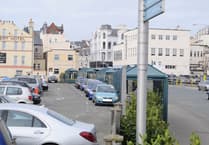A top cop has laid bare the full impact that the scourge of illegal drugs is having on the Isle of Man
Detective Chief Inspector Michelle McKillop says illicit substances lies at the heart of much of the island’s crime.
Alarmingly, a far higher percentage of those in prison are now behind bars for drug-related offences compared to the rest of the UK.
Det Chief Insp McKillop said: ‘A total of 33% of the prison population in the island is for drug-related offences while in the north west of England, which is probably similar to the rest of the country, it is just 7%.’
Her comments come after she spearheaded Operation Nightjar which put 16 drug dealers behind bars following a huge police clampdown in the latter part of 2023 involving undercover officers.
‘I understand the pressure this puts on our prison which is already at capacity, but we have worked with the governor on the logistics,’ Det Chief Insp McKillop said.
‘We are also working with the likes of Motiv8 to provide assistance for those with addiction. Part of our strategy is education and ensuring teenagers are made aware of the issues. We are making a difference, but drugs are prevalent here.’

Det Chief Insp McKillop says one of the biggest challenges is patrolling the island’s borders.
She said: ‘Drugs are being brought in by boat, often hidden in cars, or drug gangs use the postal system or bring them in on fishing boats.
‘We are working with customs and immigration, but the problem is our borders are porous. Until we can address that, we will always have problems.’
Operation Nightjar saw officers from the north west of England work undercover as members of the public approaching street dealers, either in person or through social media, such as Snapchat.
Following the undercover operation a series of arrests were made throughout January and February this year.
‘I am really pleased with the way the operation has been conducted and how it turned out, we got the right result,’ Det Chief Insp McKillop said. ‘The objective of the operation has been met.
‘As a result, we have a much clearer understanding of the methods used by people involved in this sort of crime and we can use that going forward.
‘This was a joint operation with the North West Regional Organised Crime Unit and we used their trained officers who specialise in covert work and have no known connections to the island.
‘Those we targeted as part of Operation Nightjar are at the lowest end of the scale but without these drug dealers the bigger fish won’t reap the rewards.
‘Our local teams were working with other agencies on a sophisticated system to target bigger fish. We will continue to target the high end dealers ’
.jpg?trim=0,51,0,278&width=752&height=501&crop=752:501)
Det Chief Insp McKillop believes there will be a longer term impact to the operation.
‘To some degree, the operation helped raise awareness of the prevalence of controlled drugs on our streets,’ she explained. ‘It is important the public knows what is happening.
‘What shocked me is that a number of these dealers have jobs and families. There was a lot of people not previously known to us.
‘There seems to be a blasé attitude and these people are risking everything just for a few hundred quid. There will be an impact for these people now who now have a criminal record.
‘There are things they cannot do now, like travel to the US.
‘It is difficult to measure the impact of the operation but we have certainly disrupted drug dealing on the island. People will now think twice about dealing.’
There may be concerns over the cost of such a large operation, but Det Chief Insp McKillop says that much of it will be funded through seized criminal assets.
‘It has been cost-effective,’ she said. ‘In the main the cost has been met through the seized asset fund. When we seize assets from criminals, we can use that to fund our operations.
‘The only other cost was paying for the officers from the UK.’
Det Chief Insp McKillop believes cocaine dealing in the island has fuelled an increase in violent crime.
She said: ‘The prevalence of cocaine dealing on the streets of Douglas is quite disturbing. This island is relatively safe but we are seeing an increase in serious assaults and the severity of assaults which are linked to organised crime.
‘Vulnerable members of the community are being exploited to facilitate organised crime locally.’
.jpg?trim=0,386,0,115&width=752&height=501&crop=752:501)
The operation targeted cocaine dealing which remains the biggest issue on the island right now but other drugs remain a concern.
‘Cocaine is the most prevalent class A drug over here while ketamine is also a concern,’ Det Chief Insp McKillop said. ‘But heroin has a presence and there is a group within our community we are aware of.
‘Cannabis also remains an issue but it has been complicated by the legalising of medicinal cannabis and we have to identify the legal users from illicit dealing.’
Det Chief Insp McKillop is also acutely aware of the designer drugs which have blighted communities across the pond.
‘We are aware of fentanyl which is not a big issue here but it is present and very dangerous,’ she said. ‘Even our officers handling it are at risk.
‘We are also bracing ourselves for nitazenes (a super-strength synthetic opioid) which have not appeared here yet. ‘Our colleagues in the north west have been talking about it and it is something we are aware of.’
.jpg?trim=0,186,0,336&width=752&height=501&crop=752:501)


.jpeg?width=209&height=140&crop=209:145,smart&quality=75)

Comments
This article has no comments yet. Be the first to leave a comment.